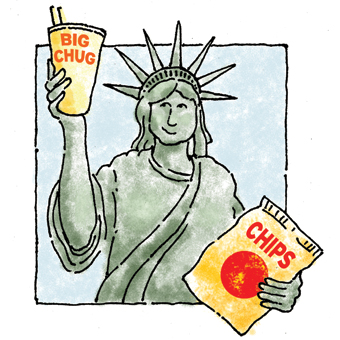Banning the Big Gulp isn’t enough to tip the scales in America’s obesity epidemic.
Gluttony is the only one of the not-so-magnificent seven that is literally a deadly sin; Americans have been proving that through congested arteries and heart disease for decades. Lifestyle-driven diabetes makes a cross of daily life for thousands and now even burdens U.S. children, many of whom contract the debilitating illness because of sedentary childhoods and poor eating habits.
Current rates of obesity in the United States have been unknown to recorded human history. The nation’s leanest state today—Colorado, with 20 percent obesity—just 15 years ago would have qualified as its fattest. The obesity epidemic has obvious personal costs, but it also creates losses for the economy in health resources, premature deaths, and reduced productivity.
It’s no surprise that some political leaders have weighed in on the crisis. In New York, Mayor Michael Bloomberg proposes clearing store shelves of perhaps their most useless product, the food-like entity we know as soda or pop and its uncarbonated variants. Bloomberg’s proposal would limit all “sugar water” products—a misnomer since virtually all such products are sweetened with high fructose corn syrup (HFCS)—to just 16 ounces.
The proposal has already generated outrage among those who haven’t seen a government regulation they like. But you don’t have to be a civil libertarian to spot government overreach, even if it’s just across a 7-Eleven counter to knock a 64-ounce soft drink out of your hand. Beyond the specter of a tsk-tsking nanny state that it raises, the mayor himself suggests a fatal flaw in the proposed code: No one could stop consumers from buying two or three 16-ounce HFCS drinks, he reassures skeptics.
But while Bloomberg’s method may be wrong, his concerns are not misplaced: The obesity crisis is real, and government regulation is partly the answer. (Getting off our couch once in a while and eating non-processed, locally grown food wouldn’t hurt either.) Bloomberg’s error is to apply government authority at the wrong end of the problem.
Americans don’t need ordinances aimed at rebooting consumption patterns. The government regulation that has gone off track can be located at the beginning of the food system, where federal programs encourage vast overproduction of commodities that propel “innovations” like HFCS.
Americans, like lab rats, are only learning to consume as the market-clearing needs of our system dictate. Overproduction leads to a market glut of corn, cleared by the creation of a new magical food additive that leads to a glut of a different sort—one that hangs around consumers’ waists as they are trained to accept ever-larger portions of empty calorie products.
Bloomberg’s 16-ounce limit is one way to interrupt this cycle, but a better approach may be to turn down the commodity spigot by committing firmly to a reform of the federal farm subsidy program. Every four years the nation has the opportunity to reconfigure its diet with the renewal of the federal farm bill. It will do so again this year by October.
The 2012 farm bill will establish policies that guide not only what we grow but what we, and the rest of the world, will eat. U.S. bishops are calling for an overhaul of “our nation’s broken and outdated agricultural policies,” arguing for a more finely tuned subsidy program to promote economic and environmental sustainability for farmers here and abroad and guarantee sustenance to the world’s hungry, including those within U.S. borders.
Let’s not forget that America’s overeating weighs heavily on the world, not just on our own bathroom scales. U.S. overproduction can wipe out subsistence farmers in the developing world, forcing them off the land and making them pay more for first world food products. Before wasting any more political calories on anti-Big Gulp ordinances, the fine print of the farm bill needs to be explored with an eye to healthy and moral eating.
From the perspective of overall national health, our cheap food policies appear costly indeed.
This article appeared in the August 2012 issue of U.S. Catholic (Vol. 77, No. 8, page 39).
Image: Tom Wright












Add comment